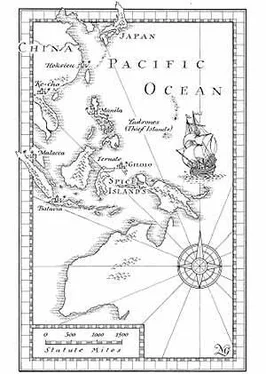They passed through an antechamber where several more kabo were on duty, and then into a large reception hall. Shafts of sunlight streamed in through small windows high in the walls and made pools of such bright light that it was difficult to see into the shadowy outer fringes of the room. There was very little by way of furniture – some carved chests, a few low tables and several silk screens. The floor was covered in coir matting. Various men were standing about, but appeared to be doing nothing more than passing the time in silence. They were dressed like Mansur in long, loose black gowns and the same pyramid-shaped velvet caps, and Hector presumed they were attendants and courtiers. A faintly musty fragrance pervaded the air and reminded Hector of the disused warehouse. There was a general sense of lethargy and inactivity. The chamberlain led his little group into the centre of the room, and a rhythmic swaying movement in the far shadows caught Hector’s attention. It was caused by a large feathered fan, its long shaft held by a servant. He was wafting it back and forth. But the action was so slow and lazy that it scarcely disturbed the air.
Hector blinked. Beneath the fan and seated cross-legged on a low divan amid a mass of cushions was a small, very wizened old man. He wore a dishevelled white robe edged with yellow, and his lopsided turban was loosely tied and supported a tall spray of orange-red feathers. Under the bulk of the turban his face had so shrivelled with age that the bones of the skull stood out clearly. There were shadowed hollows at his cheeks and his temples where the flesh had fallen away, and his mouth was a pucker of wrinkles. From this ancient face peered a pair of watery, red-rimmed eyes. Hector guessed the shrunken old man was the ruler of Omoro and at least eighty years old, possibly more.
Mansur performed a low, graceful bow, bringing his hands up to his face in a gesture of obedience. Hector copied him, as did Dan, Jacques and Vlucht.
In a loud, high voice the chamberlain launched into some sort of introduction. When he finished there was a pause while the Sultan squinted several times as if trying to focus his gaze. Then he waved a tiny, claw-like hand towards a small inlaid box on a low table beside him and croaked a few words in a language that Hector found incomprehensible.
‘His Majesty asks if you will partake of betel nut with him,’ Mansur translated into Spanish, quickly adding in a low voice, ‘You are not expected to accept. This is a formality.’
Hector realized that his companions behind were waiting for him to speak up on their behalf.
‘Your Majesty,’ he said in Spanish, ‘it is a very great honour to be received at your court.’
The Sultan gave a sudden grimace, which Hector took to be a smile. There was a manic air about the old man. It was as if he might suddenly burst into a cackle of laughter or shriek angrily. The old man looked straight at Hector and mumbled a few words, which were clearly meant to be understood without the need for an interpreter. Hector surmised that the Sultan imagined he was speaking Spanish. If so, his meaning was lost.
To cover his confusion and hide his ignorance, Hector bowed again.
Mansur came to his rescue. ‘His Majesty thanks you for your presents,’ he murmured.
For a moment Hector failed to understand what the chamberlain meant. Then one of the Sultan’s attendants emerged from behind a screen. The man was holding a cushion on which lay the Westflinge ’s main steering compass. He advanced towards the Sultan, knelt and placed the cushion and compass on the ground in front of him. Moments later another attendant appeared with the ship’s spare compass, then in quick succession the servants brought in half a dozen of the muskets that had been recovered from the camp and laid them out on the wooden floor.
Behind him the Westflinge ’s captain gave a derisive snort. ‘Another way of robbing us, like those bastards did in China,’ he muttered under his breath.
As the array of items increased, the Sultan sat hunched amid his pile of cushions. Occasionally he cracked his knuckles with an unpleasant, squelching sound. The only time he displayed any animation was when the attendant carried in Vlucht’s hourglass. The Sultan beckoned and the attendant brought up the object for closer inspection. The Sultan reached out and took the glass, then turned it over so that the sand began to run. He stared at the trickle of grains for half a minute before handing the instrument back to the servant and waving him away. The hourglass joined the pile of items salvaged from the ship.
Vlucht gave an unhappy grunt. Two attendants had appeared, carrying between them the box that contained the hen-and-chickens clock. They set the box on the ground before the Sultan, opened the lid and lifted out the mechanical toy. They placed it on the lid of the box and stood back. The Sultan eyed the model balefully. Then he turned to his chamberlain and spoke.
‘His Majesty asks what the purpose of this device is. He says he is offended by the gift of a humble chicken,’ said Mansur.
‘Please tell him that it is a clock,’ said Hector.
There was a rapid exchange between the chamberlain and his master, and then Mansur said, ‘His Majesty says you have already given him a timepiece. Why do you give him a second one?’
At that moment Hector realized the Sultan was not as senile as he looked. He had worked out for himself the reason for the sand running through the hourglass.
Hector decided to take a chance. ‘The clock with the bird is very special,’ he said. ‘It is for His Majesty’s entertainment. There is no other clock like it.’
Behind him Vlucht sucked in his breath in surprise. ‘Christ, lad. Watch what you are doing.’
The Sultan leaned forward unsteadily and spat a feeble jet of red betel juice towards a silver spittoon beside his couch. Most of the liquid splashed on the floor, and a dribble of the juice was left running down his chin. He spoke disdainfully to his chamberlain.
‘His Majesty does not believe that a bird and its young ones can tell the passage of time,’ said the chamberlain.
‘Dan, can you show him how the clock works,’ said Hector out of the side of his mouth.
‘Dear God, let’s pray it performs better than in Hoksieu, or we’ll never leave this place alive,’ the Westflinge ’s captain muttered as the Miskito walked forward and wound up the spring to drive the mechanism. He adjusted the hands to a point just before midday and stepped back. Once again everyone waited and watched for the machine to work. Even the courtiers had edged forward to get a better view.
The cogs inside the machine’s base began to whirr. The chicks started their circuit around the mother hen’s feet. The hen leaned forward and began to raise her wings. Then, as before, something went wrong. There was a muffled twang, and all movement abruptly stopped. The mechanical hen remained at half-tilt, her chicks frozen in place.
There was a nervous silence, which lasted for several moments. No one moved. Hector was aware that beside him the chamberlain had gone tense, as if awaiting an angry outburst from his master.
During this interval Dan calmly stepped forward and opened the metal flap that concealed the clockwork. Ignoring everyone, he felt inside and must have reset the mechanism, for he closed the flap, reset the hands of the clock and took a pace backwards.
Once again the hands of the clock came together and the hen and her chicks began to move. All went well until the moment came for the hen to raise her wings and flap and crow. Instead she had raised them halfway when a cog slipped and then jammed. The mother hen jerked forward. Her wings began to quiver and vibrate madly. The creature let out a harsh metallic cry.
Читать дальше








